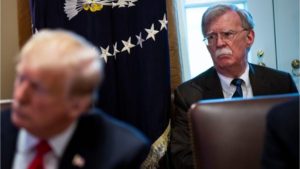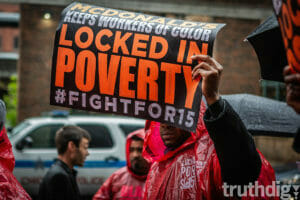The New Tribalism and the Decline of the Nation State
We are witnessing a reversion to tribalism around the world, away from nation states The same pattern can be seen even in America -- especially in American politics The same pattern can be seen even in America —especially in American politics. seanmcmenemy (CC BY 2.0)
seanmcmenemy (CC BY 2.0)
This post originally ran on Robert Reich’s Web page.
We are witnessing a reversion to tribalism around the world, away from nation states. The the same pattern can be seen even in America – especially in American politics.
Before the rise of the nation-state, between the eighteenth and twentieth centuries, the world was mostly tribal. Tribes were united by language, religion, blood, and belief. They feared other tribes and often warred against them. Kings and emperors imposed temporary truces, at most.
But in the past three hundred years the idea of nationhood took root in most of the world. Members of tribes started to become citizens, viewing themselves as a single people with patriotic sentiments and duties toward their homeland. Although nationalism never fully supplanted tribalism in some former colonial territories, the transition from tribe to nation was mostly completed by the mid twentieth century.
Over the last several decades, though, technology has whittled away the underpinnings of the nation state. National economies have become so intertwined that economic security depends less on national armies than on financial transactions around the world. Global corporations play nations off against each other to get the best deals on taxes and regulations.
News and images move so easily across borders that attitudes and aspirations are no longer especially national. Cyber-weapons, no longer the exclusive province of national governments, can originate in a hacker’s garage.
Nations are becoming less relevant in a world where everyone and everything is interconnected. The connections that matter most are again becoming more personal. Religious beliefs and affiliations, the nuances of one’s own language and culture, the daily realities of class, and the extensions of one’s family and its values – all are providing people with ever greater senses of identity.
The nation state, meanwhile, is coming apart. A single Europe – which seemed within reach a few years ago – is now succumbing to the centrifugal forces of its different languages and cultures. The Soviet Union is gone, replaced by nations split along tribal lines. Vladimir Putin can’t easily annex the whole of Ukraine, only the Russian-speaking part. The Balkans have been Balkanized.
Separatist movements have broken out all over — Czechs separating from Slovaks; Kurds wanting to separate from Iraq, Syria, and Turkey; even the Scots seeking separation from England.
The turmoil now consuming much of the Middle East stems less from democratic movements trying to topple dictatorships than from ancient tribal conflicts between the two major denominations of Isam – Sunni and Shia.
And what about America? The world’s “melting pot” is changing color. Between the 2000 and 2010 census the share of the U.S. population calling itself white dropped from 69 to 64 percent, and more than half of the nation’s population growth came from Hispanics.
It’s also becoming more divided by economic class. Increasingly, the rich seem to inhabit a different country than the rest.
But America’s new tribalism can be seen most distinctly in its politics. Nowadays the members of one tribe (calling themselves liberals, progressives, and Democrats) hold sharply different views and values than the members of the other (conservatives, Tea Partiers, and Republicans).
Each tribe has contrasting ideas about rights and freedoms (for liberals, reproductive rights and equal marriage rights; for conservatives, the right to own a gun and do what you want with your property).
Each has its own totems (social insurance versus smaller government) and taboos (cutting entitlements or raising taxes). Each, its own demons (the Tea Party and Ted Cruz; the Affordable Care Act and Barack Obama); its own version of truth (one believes in climate change and evolution; the other doesn’t); and its own media that confirm its beliefs.
The tribes even look different. One is becoming blacker, browner, and more feminine. The other, whiter and more male. (Only 2 percent of Mitt Romney’s voters were African-American, for example.)
Each tribe is headed by rival warlords whose fighting has almost brought the national government in Washington to a halt. Increasingly, the two tribes live separately in their own regions – blue or red state, coastal or mid-section, urban or rural – with state or local governments reflecting their contrasting values.
I’m not making a claim of moral equivalence. Personally, I think the Republican right has gone off the deep end, and if polls are to be believed a majority of Americans agree with me.
But the fact is, the two tribes are pulling America apart, often putting tribal goals over the national interest – which is not that different from what’s happening in the rest of the world.
Your support matters…Independent journalism is under threat and overshadowed by heavily funded mainstream media.
You can help level the playing field. Become a member.
Your tax-deductible contribution keeps us digging beneath the headlines to give you thought-provoking, investigative reporting and analysis that unearths what's really happening- without compromise.
Give today to support our courageous, independent journalists.






You need to be a supporter to comment.
There are currently no responses to this article.
Be the first to respond.